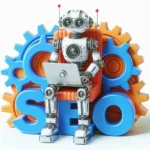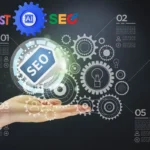Everyone wants to rank quickly, but many don’t know how to do it. Ai For On Page SEO is a new and powerful tool in the world of SEO. Search engine optimization (SEO) is a critical part of digital marketing. It’s how websites get noticed by search engines like Google, Bing, and others. Proper SEO helps websites reach a larger audience by showing up in search results.
AI is changing the way websites are optimized to rank better in search engines. But how exactly does AI help with SEO? In this guide, we’ll cover everything you need to know about Ai For On Page SEO, from basic concepts to advanced strategies, and how to use AI tools or prompts to improve your website’s visibility and rank faster on search engines.
Table of Contents
1. Understanding Ai For On Page SEO
Before we dive into the details of On-Page SEO, let’s first take a moment to understand what it actually means
1.1 What is On-Page SEO?
On-page SEO is the process of improving individual web pages to help them rank higher in search engine results and attract more visitors. It focuses on both the content of the page and the HTML code behind it.
By optimizing things like your page content, keywords, and website structure, on-page SEO helps your site show up more often when people search online.
Key elements of on-page SEO include creating high-quality content, using the right keywords, improving your meta tags, and making sure your page loads quickly.
When done right, on-page SEO can help improve your website’s visibility and drive more relevant traffic to your pages.
On-page SEO helps improve your website’s visibility and ranking on search engines. Some of the most important elements of on-page SEO include:

1.2 Content Quality:
To create high-quality content for your website, it’s important that the content is directly related to your chosen keywords. This means your content should focus on the topics or questions your audience is searching for. It should provide useful, relevant information that helps solve their problems or answer their questions. When your content matches what users are looking for, it adds value, builds trust, and makes your site more likely to rank well in search engines.”-
1.3 HTML Tags
HTML tags like title tags, header tags, and meta descriptions are key elements for optimizing web pages for both search engines and users. Title tags appear in search results as the clickable headline for a webpage, so they should accurately describe the content and include relevant keywords. Header tags (H1, H2, H3, etc.) help organize content by creating a clear structure, making it easier for both users and search engines to understand the main topics and subtopics of the page. Meta descriptions provide a brief summary of the page’s content and appear below the title in search results, influencing click-through rates by enticing users to visit the page. All of these tags play an important role in improving search engine rankings and enhancing user experience.
1.4 Internal Links
Internal linking is when you add links on your website that lead to other pages on the same site. It helps search engines like Google understand and organize your content better, making it easier to find and rank. Internal links also help your visitors find more useful information on your site, improving their experience and keeping them on your site longer. By using clear, relevant link text (the clickable words), and connecting important pages, you can improve your site’s visibility, boost SEO, and make navigation smoother for users.
1.5 Image Optimization
Image Optimization means making your images smaller in size without losing quality so your website loads faster. Faster loading pages create a better experience for visitors and help your site rank higher in search engines. Also, by adding clear descriptions (called **alt text**) to your images, you make it easier for search engines to understand them, which can improve your SEO.
These factors help your page rank higher in search engines. In the past, improving them took a lot of time and guesswork. Now, there are easier ways to optimize these elements. That’s where AI For On Page SEO comes in.
1.6 What is Ai For On Page SEO?
Ai For On Page SEO means using smart tools powered by artificial intelligence (AI) to improve and optimize the content and structure of your website. The goal is to help your site rank higher in search engines like Google.
These AI tools work by analyzing a lot of data quickly and finding patterns or trends that humans might miss. They help make your website SEO-friendly (search engine optimization), which means they help your site show up more often in search results when people search for related topics.
AI doesn’t replace the need for human input in SEO, but it makes the whole process easier, faster, and more accurate. SEO professionals can use AI to automate repetitive tasks and focus on the creative and strategic aspects of SEO.
1.6.1 How Does AI Help in SEO?
AI helps in SEO by processing huge amounts of data in seconds. This is something that would take humans a lot of time to do. By doing so, AI can find patterns and trends that are useful for optimizing a website. Here are some ways AI can help:
1.6.2 Optimize Content
AI tools can look at the content on your website and suggest ways to make it better for search engines. For example, AI might suggest using certain keywords or phrases more often, or it might recommend adding content about a topic that people are searching for. This helps make your content more likely to show up in search results.
- Content Improvement: AI can suggest changes to titles, headings, and paragraphs to make them more SEO-friendly.
- Keyword Optimization: It can suggest long-tail keywords (longer, more specific search terms) that are more likely to drive traffic to your site.
1.6.3 Automate Repetitive Tasks
SEO involves a lot of repetitive tasks, and AI can take care of many of these automatically, saving time and effort. For example, AI can:
- Generate Meta Tags: Meta tags are small descriptions of your page that show up in search results. AI can automatically create or optimize these for better performance.
- Create Schema Markup: Schema markup is a way to give search engines more information about your content. AI can generate this code for you.
- A/B Testing: AI can help run tests to see which versions of a page perform better and suggest changes based on the results.
1.6.4 Predict Trends
AI can analyze past data and predict future trends. This means it can help you stay ahead of changes in search engine algorithms and user behavior. For example, AI might notice that a certain type of content is becoming more popular and suggest that you create something similar.
- Trend Prediction: AI helps you understand what people will be searching for in the future, so you can adjust your content strategy before those trends become mainstream.
1.6.5 Improve User Experience (UX)
AI tools can also help make your website more user-friendly. They can analyze things like page speed, navigation, and mobile responsiveness, then suggest improvements. A better user experience helps your site rank higher and keeps visitors engaged.
- Page Speed: AI can help identify issues that are slowing down your site and suggest solutions to improve load times.
- Mobile Optimization: Since many people use mobile phones to browse, AI can ensure your site is optimized for mobile devices.
1.6.6 Link Building and Internal Linking
AI can help you manage your internal links (links that point to other pages on your site) and suggest external links that can boost your website’s authority. AI tools can recommend how to build backlinks (links from other sites to yours), which are important for SEO.
1.7 Why Should You Use Ai For On Page SEO?
- Time-Saving: AI automates many repetitive tasks, which saves you time. Tasks like keyword research, meta tag creation, and A/B testing can all be done faster by AI.
- Accuracy and Efficiency: AI uses data-driven algorithms to make accurate predictions and suggestions, reducing the chances of human error.
- Data-Driven Insights: AI provides actionable insights based on large datasets, helping you make smarter decisions when optimizing your content and website.
- Scalability: If you manage multiple websites or need to optimize hundreds of pages, AI helps handle large-scale SEO tasks quickly and efficiently.
- Staying Ahead of Trends: AI helps you predict SEO trends and stay ahead of changes in search engine algorithms. This is key to keeping your website competitive in a constantly evolving digital world.
1.8 AI and Human Collaboration in SEO
While AI does a lot of the heavy lifting, human expertise is still important. AI can suggest improvements, but it’s up to SEO professionals to decide what’s best for the website’s goals and make the final decisions.
Here’s how AI fits into the overall SEO process:
- AI for Automation: Automates tasks like keyword research, content optimization, and meta tag creation, saving you time.
- Human for Strategy: SEO experts still make the big decisions. They interpret AI insights and decide how to implement them in a way that aligns with business goals.
2. The Role of AI in Enhancing On-Page SEO
Now that you have a basic understanding of what Ai For On Page SEO is, let’s dive deeper into how AI improves different parts of SEO. From keyword research to content creation and page optimization, AI plays a big role in making your website more SEO-friendly and helping it rank higher on search engines.
2.1 Keyword Research and Optimization with AI
Choosing the right keywords for your website is one of the most important aspects of SEO. Keywords are the words and phrases that people type into search engines when looking for information. Using the right ones helps your website appear in search results when people search for topics related to your content.
Traditional keyword research usually involves:
- Brainstorming ideas,
- Using keyword tools to check search volumes
- Analyzing how competitive each keyword is.
However, Ai For On Page SEO takes keyword research to a new level by automating this process and offering much deeper insights. Here’s how AI helps with keyword research:
- Analyze Search Volume and Competition: AI tools can quickly analyze the search volume (how often a keyword is searched) and the competition (how hard it is to rank for that keyword). This allows you to focus on keywords that are easier to rank for and likely to bring in more traffic.
- Understand Search Intent: AI tools also analyze the search intent behind keywords. This means AI can figure out whether people are looking to buy something, find information, or solve a problem when they search. By understanding this, you can create content that better matches what users are actually looking for.
- Find Long-Tail Keywords: Long-tail keywords are more specific phrases that usually have less competition. For example, instead of using the broad keyword “shoes,” AI might help you find more specific terms like “best running shoes for flat feet.” These long-tail keywords often lead to higher conversion rates because they target people with very specific needs.
With Ai For On Page SEO, you can find the best keywords to target and make sure you are reaching the right audience.
2.2 Content Creation and Optimization with AI
Content is at the heart of any SEO strategy. Search engines like Google reward websites that have high-quality, relevant content. The challenge is to create content that’s both useful to people and optimized for search engines. This can take a lot of time and effort.
Here’s where Ai For On Page SEO can help:
- Generate Content Ideas: AI can suggest blog post ideas or topics based on what’s trending or what people are searching for. This ensures that your content is always fresh and relevant.
- Optimize Content for SEO: AI can analyze your existing content and suggest improvements to make it more SEO-friendly. For example, AI might suggest adding certain keywords, using better headings, or improving the readability of your text.
- Write or Improve Content: Some AI tools can even help you write parts of your content. They can suggest ways to improve your writing or generate text based on the topics you’re working on. This helps you save time while maintaining high-quality content.
- Monitor Content Performance: AI tools can also track how well your content is performing over time. If certain articles start to lose their rankings, AI can recommend changes to keep them fresh and aligned with search engine updates.
With Ai For On Page SEO, you can create content more efficiently, ensuring it’s always optimized for both users and search engines.
2.3 On-Page Optimization with AI
On-Page SEO is about optimizing the different elements on your website to make it more attractive to search engines. This includes things like title tags, meta descriptions, header tags, and internal linking. These elements help search engines understand what your pages are about and how to rank them.
AI can play a huge role in improving these on-page elements:
- Title Tags and Meta Descriptions: AI can suggest keyword-rich title tags and meta descriptions that clearly explain what your page is about. This is important because these elements show up in search engine results and influence whether people click on your link.
- Header Tags (H1, H2, H3): AI can recommend how to structure your page using header tags (like H1, H2, H3). These tags help break up your content into sections, making it easier to read and helping search engines understand the structure of your page.
- Internal Linking: Internal links are links from one page on your website to another. AI tools can identify areas where you can add more internal links to boost the authority of your pages. This can help your pages rank higher and improve user experience.
By using Ai For On Page SEO, you can automatically optimize these important elements to improve both user experience and search engine rankings.
3. AI-Driven Keyword Research and Optimization
Effective keyword research is one of the most important steps in any SEO strategy. Choosing the right keywords helps search engines understand what your content is about and ensures that your website shows up when people search for relevant topics. Ai For On Page SEO has completely transformed the way we do keyword research and optimization. Let’s take a closer look at how AI helps make this process faster, smarter, and more efficient.
3.1 Identifying Relevant Keywords with AI
AI-powered keyword research tools analyze massive amounts of data from search queries to find the best keywords for your website. These tools consider factors like:
- Search volume (how often a keyword is searched),
- Competition (how many other websites are targeting the same keyword),
- User intent (the reason behind a person’s search).
By processing all of this information, AI can recommend the most relevant keywords that are likely to bring traffic to your site. This helps you focus on keywords that have a better chance of helping your website rank higher.
Ai For On Page SEO doesn’t just stop at general keywords. It can also help identify long-tail keywords, which are longer and more specific phrases. For example, instead of going for a broad keyword like “SEO,” AI might suggest a long-tail keyword like “best AI tools for on-page SEO.” These long-tail keywords are easier to rank for because they have less competition, and they often attract a more targeted audience.
Long-tail keywords are important because they help you reach people who are looking for very specific information, products, or services, which means they are more likely to convert into customers or engaged users.
3.2 Analyzing User Intent Using AI Tools
User intent is a key part of keyword research that many people overlook. It refers to the reason behind a person’s search. Are they looking for general information? Are they ready to buy something? Understanding user intent is important because it helps you choose the best keywords that match what users are actually looking for.
AI tools can analyze the behavior of users, such as the types of searches they make and how they interact with search results. This helps you understand whether users are in the research phase (seeking information), the buying phase (ready to make a purchase), or the navigation phase (looking for a specific website).
For example:
- If users search for “best SEO tools,” they may be looking for product recommendations (buying intent).
- If they search for “how to improve on-page SEO,” they’re probably looking for informational content.
By analyzing user intent, Ai For On Page SEO helps you pick the right keywords and create content that answers the questions or needs of your audience directly. This makes your content more likely to satisfy both search engines and users, improving your chances of ranking higher.
3.3 Leveraging AI for Long-Tail Keyword Identification
Long-tail keywords are longer, more specific keyword phrases that are often easier to rank for and bring in more qualified traffic. They tend to have lower search volumes, but people who search for these terms are usually further along in their decision-making process and are more likely to take action, such as signing up for your newsletter or making a purchase.
For example, instead of trying to rank for the broad keyword “shoes,” you might target the long-tail keyword “best running shoes for flat feet.” While fewer people may search for this specific phrase, those who do are likely to be very interested in finding a solution to their problem, making them more likely to convert.
Ai For On Page SEO makes it easy to identify these long-tail keywords by analyzing search patterns and trends. AI tools can identify keywords that are more specific but still relevant to your content, giving you a competitive advantage. Often, these long-tail keywords are overlooked by competitors who focus on broader terms, which means you can capture a more targeted audience with less effort.
By using AI, you can find these valuable keywords that might be hidden in the vast sea of search data. These keywords can help you rank for specific terms that attract users who are more likely to engage with your site.
4. AI-Powered Content Creation and Optimization
Creating high-quality content is one of the most important factors in SEO. It helps your website rank higher in search engines, attracts more visitors, and keeps them engaged. However, writing content that is both SEO-friendly and valuable to readers can be time-consuming and requires consistent effort. This is where Ai For On Page SEO comes in. AI tools can make the content creation process faster, easier, and more effective, ensuring that your content ranks well on search engines and meets your audience’s needs.
Let’s dive deeper into how Ai For On Page SEO can help with content creation and optimization.
4.1 Using AI for Content Generation
AI-powered content generation tools use a technology called natural language processing (NLP), which allows the AI to understand and mimic human language. These tools can create content that is not only readable but also optimized for SEO.
Here’s how AI can help with content generation:
- Writing SEO-Friendly Content: AI can automatically generate content that includes keywords and follows best practices for SEO. For example, it can write blog posts, product descriptions, landing pages, and more while making sure the content is optimized for search engines.
- Analyzing Existing Content: AI can analyze your current content and suggest improvements to make it more SEO-friendly. It might recommend adding keywords, improving readability, or adjusting the structure to make it more engaging for users.
- Rewriting Content: If you have existing content that isn’t performing well, AI can help rewrite it to improve the use of keywords without sacrificing quality. This allows you to update old articles quickly and keep them relevant.
Using AI for content generation not only saves time but also ensures that your content is properly optimized for both search engines and readers. This makes it more likely to rank well and engage your audience.
4.2 AI-Driven Content Gaps Analysis
To stay competitive in the world of SEO, it’s important to keep your content fresh and comprehensive. If you only cover certain topics or repeat the same information as your competitors, your content might not be as valuable. This is where Ai For On Page SEO can help you spot content gaps.
Content gaps refer to topics or areas that your competitors are covering, but you haven’t yet addressed on your website. By identifying these gaps, you can create new content that fills those voids, keeping your website relevant and comprehensive. This helps you:
- Stay ahead of competitors by covering more topics.
- Create content that’s more useful to your audience.
- Improve your search engine rankings by addressing more search queries.
Here’s how AI helps with content gap analysis:
- Comparing Content: AI tools can analyze your existing content and compare it to what your competitors are doing. By looking at the topics, keywords, and structure of their content, AI can pinpoint areas where your website is missing out.
- Identifying Opportunities: Once AI identifies these gaps, it will suggest new content topics that you should target to improve your website’s coverage of relevant subjects.
By continuously filling these gaps, Ai For On Page SEO helps you create a more comprehensive content strategy, which increases your chances of ranking higher on search engines.
4.3 Continuous Content Optimization with AI Insights
Creating great content is only half the battle. Once your content is published, it’s important to monitor how it performs and make updates when necessary. This ensures that your content stays relevant and continues to perform well over time.
Ai For On Page SEO makes it easy to continuously optimize your content by tracking its performance and offering insights on how to improve it.
Here’s how AI helps with continuous content optimization:
- Tracking Key Metrics: AI tools can monitor important metrics like traffic, bounce rates, engagement (such as comments and shares), and conversion rates. By looking at these numbers, AI helps you understand how well your content is resonating with your audience.
- Providing Optimization Suggestions: Based on the performance data, AI can suggest updates to your content. For example, if a blog post has a high bounce rate, AI might suggest improving the intro or adding more engaging visuals. If a page isn’t getting much traffic, AI might recommend using different keywords or adjusting the headings.
- Staying Relevant: Since search engine algorithms and user interests are always changing, AI helps ensure that your content remains updated and relevant. This gives you the edge over competitors who might not be keeping their content fresh.
With Ai For On Page SEO, you can make data-driven decisions to improve your content and keep it optimized for both search engines and users.
5. AI-Optimized Meta Tags and Descriptions
Meta tags and meta descriptions are small but crucial elements of your website that can make a big difference in how your pages perform in search engines. These tags help search engines understand the content of your pages and also serve as a preview of your content for users. When done right, they can improve your search engine rankings and increase the chances of people clicking on your page in search results.
Ai For On Page SEO can significantly help you craft optimized meta tags and meta descriptions that boost both your rankings and click-through rates. Let’s look at how AI can help optimize these elements for better SEO performance.
5.1 Crafting Compelling Meta Tags with AI Assistance
A meta tag typically includes two key elements: the title tag and the meta description. Both are essential for making your page stand out in search engine results pages (SERPs):
- Title Tags: This is the clickable headline that appears in search results. A compelling title tag should be relevant, clear, and engaging to encourage users to click on your link.
- Meta Descriptions: This is the brief description that appears below the title tag in search results. It gives users a quick preview of what they can expect from the page.
Here’s how Ai For On Page SEO can help optimize these elements:
- Title Tag Optimization: AI can automatically generate title tags based on the most relevant keywords for your page. It ensures that the title is concise, clear, and engaging. By doing this, AI makes sure your title tags follow SEO best practices and align with user intent (what people are searching for).
For example, AI could suggest a title like:
“Best AI Tools for On-Page SEO: Top Picks for 2024”
This is clear, includes the keyword, and is likely to attract clicks.
- Meta Description Creation: AI can analyze your page’s content and suggest meta descriptions that include targeted keywords and are optimized for user intent. It also ensures that the meta descriptions stay within the recommended character limits (usually 150-160 characters), making them more likely to display properly in search results.
For example, AI could suggest a meta description like:
“Discover the best AI tools for on-page SEO in 2024. Improve your rankings and boost traffic with these top-rated tools.”
By automating the creation of meta tags and meta descriptions, Ai For On Page SEO saves you time while ensuring your content is SEO-friendly and more likely to attract clicks.
5.2 A/B Testing Meta Descriptions Using AI Algorithms
A/B testing is the process of testing two versions of something—like a meta description—to see which one performs better. When it comes to meta descriptions, A/B testing can help you understand which version gets more clicks, ultimately improving your click-through rate (CTR).
Here’s how Ai For On Page SEO makes A/B testing easier and more effective:
- Automation: AI tools can automatically generate multiple versions of meta descriptions. For example, it can create different versions of a meta description with slight variations in wording, tone, or keyword placement. These versions are then tested against each other to see which one performs best.
- Data-Driven Insights: After running the A/B tests, AI tools analyze the results and provide data-driven insights. For instance, if one meta description results in a higher CTR, the AI can suggest that you use that version more often.
- Continuous Optimization: AI can continually test and optimize your meta descriptions, ensuring that your pages are always using the most effective descriptions to increase engagement.
By continuously running A/B tests and optimizing meta descriptions, Ai For On Page SEO helps you stay ahead of changes and ensure that your pages perform at their best in search results.
6. AI and Schema Markup for Structured Data
Schema markup is a special type of code that you add to your web pages to help search engines better understand the content on your site. Think of it like giving search engines a map to the information on your page. This extra information makes it easier for search engines to display your content in a more detailed and visually appealing way, like in rich snippets or knowledge panels.
Using Ai For On Page SEO, you can automate the process of adding schema markup to your pages, which can improve your visibility in search engine results and help your pages stand out.
6.1 Understanding Schema Markup and AI’s Role
Schema markup is a way to tell search engines exactly what your content is about. It helps search engines understand specific details on your page, like:
- Products: Price, availability, and review ratings.
- Articles: The headline, author, and publication date.
- Events: The date, time, and location of an event.
For example, if you run an e-commerce site, schema markup can tell Google things like the price, availability, and review ratings of your products. This allows Google to show this extra information in search results, often as rich snippets (like showing the price and star ratings directly in the search results).
Ai For On Page SEO can help you add schema markup to your pages automatically, without needing to know any code. Here’s how AI can make schema markup easier:
- Automatic Schema Generation: AI tools analyze the content of your pages and suggest the right schema markup. For example, if you have a product page, AI can add the correct product schema that tells search engines about the product’s price, availability, and more.
- Ongoing Optimization: As search engines evolve and update their standards, AI can automatically adjust your schema markup to stay in line with the latest best practices.
This way, you don’t have to worry about manually coding the schema or keeping up with every change made by search engines. Ai For On Page SEO does the work for you, helping you maintain proper schema markup without any extra effort.
6.2 Automating Schema Generation with AI Tools
Adding schema markup to a website usually requires coding knowledge. But with Ai For On Page SEO, the process becomes much simpler. AI tools can automatically generate the schema code for your pages by analyzing the content and selecting the right markup.
Here’s how AI automates schema generation:
- AI Identifies the Right Schema: AI tools can read your content and figure out what type of schema markup is needed. For example, if you’re posting a blog article, the AI will add Article schema to tell search engines that the page is a blog post, and it will include important details like the author and publish date.
- No Manual Coding Required: With AI, you don’t need to worry about manually writing schema code or looking up what each type of schema means. The AI does all of this automatically, saving you time and ensuring your website is properly structured for search engines.
- Enhanced Search Features: When schema is properly implemented, it can help your pages show up in enhanced search features like rich snippets, knowledge panels, or local pack results. This can make your pages stand out more in search results, leading to higher visibility and more clicks.
By automating schema generation with Ai For On Page SEO, you can ensure that all your pages are marked up correctly and that your site benefits from these enhanced search features. This makes your content more attractive to both search engines and users, helping you rank higher and get more traffic.
7. AI-Enhanced Internal Linking Strategies
Internal linking is the practice of linking one page of your website to another. It helps users navigate your site more easily and also helps search engines understand the structure of your website. Internal links also pass SEO authority (also known as link juice) between pages, which can improve their rankings in search results.
Using Ai For On Page SEO, you can enhance your internal linking strategy, making it more effective for both SEO and user experience. AI tools can automatically suggest the best internal links for your website, saving you time and ensuring your site is optimized for both search engines and visitors.
7.1 Importance of Internal Linking in AI-Driven SEO
Internal linking is important for several reasons:
- User Experience: Internal links help users find other relevant pages on your site. This keeps them on your site longer and encourages them to explore more of your content. For example, if someone is reading an article about SEO, they might also be interested in reading another article on keyword research, and an internal link will make it easy for them to find that.
- Search Engine Crawling: Internal links help search engines crawl your website and understand its structure. When a page has many internal links pointing to it, search engines know that this page is important. It also helps search engines index your content more effectively, meaning your pages have a better chance of appearing in search results.
- Passing Link Authority: Internal links pass SEO authority from one page to another. When a strong page links to a weaker page, it helps improve the ranking of the linked page. This is called link juice, and internal linking allows you to pass this authority strategically throughout your site.
With Ai For On Page SEO, you can make sure your internal linking strategy is optimized for both SEO and user experience. AI tools can analyze the content on your site and automatically suggest the best internal links based on relevance and SEO value.
7.2 AI for Suggesting Internal Links and Boosting SEO
Ai For On Page SEO tools are very effective at improving your internal linking strategy by analyzing your website’s content and suggesting internal links where they will have the most impact.
Here’s how AI can help enhance your internal linking:
- Contextual Link Suggestions: AI can analyze the content on a page and suggest internal links to other relevant pages on your website. For example, if you’re writing an article about on-page SEO and mention keyword research, AI might suggest linking to another article on your site about keyword research strategies. This ensures that links are contextually relevant, which benefits both the user and SEO.
- Anchor Text Recommendations: AI can also suggest the best anchor text to use for your internal links. Anchor text is the clickable text in a hyperlink, and it should be relevant to the content of the page you’re linking to. For example, if you’re linking to a page about SEO tools, AI might suggest using anchor text like “best SEO tools” to improve the relevance of the link for search engines.
- Link Structure Optimization: AI tools can help optimize the link structure of your site by identifying important pages that may not be receiving enough internal links. This ensures that important pages (such as cornerstone content or top-performing pages) are linked to from multiple relevant pages within your website. This helps to increase their visibility and SEO authority.
7.3 How AI Helps Improve Your Site’s Navigation and SEO
By improving your internal linking strategy with AI, you can ensure that:
- Search engines can crawl your website more effectively, helping all your pages get indexed.
- Users can easily find related content, leading to a better experience on your site.
- Your internal links pass SEO authority strategically, improving the rankings of your most important pages.
- Your link structure is optimized to highlight important pages, ensuring they get the attention they deserve.
8. AI for Performance Monitoring and Data Analysis
Once you’ve implemented your On-Page SEO strategy using AI, it’s important to track how well your efforts are working. Ai For On Page SEO tools help you monitor your site’s performance in real-time, offering valuable insights that can help you improve and refine your strategy for even better results.
8.1 Real-Time Analytics with AI-Driven Tools
One of the most valuable benefits of Ai For On Page SEO is the ability to track your website’s performance in real-time. AI-powered tools can analyze large amounts of data and provide immediate feedback on how your pages are performing, so you can see the impact of your SEO efforts instantly.
Here’s how AI-driven tools help with performance tracking:
- Tracking Key Metrics: AI tools can monitor important metrics like:
- Traffic: How many people are visiting your pages.
- Bounce Rates: How many visitors leave your site after viewing only one page.
- Conversion Rates: How many visitors take the desired action (e.g., signing up, purchasing, etc.).
- Keyword Rankings: How well your target keywords are ranking in search engine results.
By tracking these metrics in real-time, you get a clear picture of how your SEO efforts are affecting your site and which pages are performing well or need improvement.
- Performance Benchmarks: AI tools can compare your website’s performance against your competitors or industry standards. This comparison helps you understand where your website stands and identify areas where you could improve, such as optimizing specific pages or targeting new keywords.
8.2 Identifying Trends and Adapting Strategies Through AI
Another key benefit of Ai For On Page SEO is that it helps you identify emerging trends and adapt your strategies accordingly. Since AI tools analyze large datasets, they can find patterns and insights that might be hard for you to notice on your own.
Here’s how AI helps you stay on top of trends and adjust your SEO strategy:
- Identifying Top Keywords: AI can track which keywords are driving the most traffic to your site. This helps you see which topics are resonating with your audience, and allows you to target similar keywords to boost your rankings further.
- Tracking Changes in User Behavior: AI tools can detect changes in how users behave on your site. For example, if more visitors are landing on a specific page, AI can recommend content updates or additional internal links to capitalize on that page’s success.
- Adapting to Seasonal Changes: AI can suggest changes to your content strategy based on seasonal trends. For example, if searches for certain keywords spike during the holidays, AI tools can alert you to this trend and recommend optimizing your content for those keywords before the season hits.
- Suggesting Strategy Adjustments: By analyzing performance data, AI can provide actionable suggestions on what changes you should make to improve your results. For instance, AI may recommend tweaking your content to include more related keywords, adjusting your internal links, or improving page load speeds based on your bounce rates.
By using AI tools to continuously monitor performance and adapt your strategy, you ensure that your On-Page SEO efforts are always aligned with what’s working best. This means you can keep improving your rankings and visibility over time.
9. Case Studies: AI Implementation Success Stories in On-Page SEO
To help you understand how Ai For On Page SEO works in real-world situations, let’s look at a few case studies where businesses used AI tools to boost their SEO results. These examples show how AI can improve keyword optimization, content creation, internal linking, and more.
Case Study 1: E-commerce Website Increases Organic Traffic by 150% Using AI
An e-commerce company that sells home goods wanted to improve the visibility of their product pages and attract more visitors from search engines. They decided to use Ai For On Page SEO to optimize their content. Here’s how they did it:
- Keyword Optimization: AI tools analyzed their product categories and suggested high-performing long-tail keywords related to their products. By targeting more specific keywords, they attracted more targeted traffic from users who were looking for those exact products.
- Content Creation: The company used AI to generate SEO-optimized product descriptions. The descriptions were tailored to match what customers were searching for, improving relevance and ranking.
- Internal Linking: AI examined the entire product catalog and suggested which related products should be linked together. This increased user engagement, helped visitors find other products, and improved the overall authority of product pages.
Result: Over six months, the website saw a 150% increase in organic traffic. By automating key tasks like keyword research and content creation, the company saved time and could focus on other areas, such as product development and marketing.
9.1 Case Study 2: Blog Increases Page Views by 100% with AI Content Optimization
A health and wellness blog was struggling with stagnant traffic and wanted to boost its organic reach. The team decided to use Ai For On Page SEO to optimize their content strategy. Here’s how AI helped:
- Content Gaps: AI tools analyzed the blog’s existing content and compared it with competitors’ blogs. It found topics that their competitors were ranking for, but the blog hadn’t covered yet. By filling these gaps, the blog was able to attract new readers and cover more relevant topics.
- Content Optimization: AI suggested ways to improve the content, such as adding keyword-rich subheadings, improving the structure for better readability, and optimizing meta tags. This made the content not only more engaging for readers but also more SEO-friendly.
- Continuous Updates: After the blog posts were published, AI tools kept monitoring how they were performing. Based on user behavior and ranking changes, AI suggested improvements to keep the content fresh and relevant.
Result: Thanks to these AI-driven strategies, the blog doubled its page views in just three months. By automating the content optimization process, the team was able to focus more on producing high-quality content that resonated with their audience.
9.2 Case Study 3: Local Business Uses AI to Rank Higher for “Near Me” Searches
A local plumbing business in a competitive city wanted to improve its ranking for “near me” searches. They used Ai For On Page SEO to refine their local SEO strategy and improve their visibility for location-based searches. Here’s what they did:
- Local Keywords: AI analyzed search data and helped the business target location-specific keywords like “plumbing services in [city]” and “emergency plumber near me”. By focusing on these local keywords, they were able to reach customers who were specifically looking for plumbers in their area.
- Schema Markup: AI tools automatically added local business schema markup to the website. This markup helped search engines understand and display important business information (like the business’s phone number, address, and hours of operation) directly in the search results.
- Content Optimization: AI suggested optimizing the landing page with local content, such as customer reviews and testimonials, which helped the business build trust with local customers. They also included location-based content that made the page more relevant to people searching for plumbing services in the area.
Result: With the help of Ai For On Page SEO, the local plumbing business saw a 40% increase in local search visibility. The business now ranks at the top of search results for multiple high-intent keywords, bringing in more customers.
10. Conclusion: Harnessing AI for Future SEO Success
To sum up, Ai For On Page SEO is transforming the way websites are optimized and ranked in search engines. By using AI tools, website owners, marketers, and SEO professionals can save time, make smarter decisions, and significantly improve their website’s visibility. From content creation and keyword optimization to performance tracking and ongoing updates, AI is enhancing nearly every part of on-page SEO.
10.1 Why You Should Embrace AI in SEO
Here are a few key reasons why you should consider using Ai For On Page SEO for your website:
- Efficiency: AI automates many of the repetitive and time-consuming tasks involved in SEO, like keyword research, meta tag generation, and content optimization. This allows you to focus on the creative and strategic aspects of SEO, rather than getting bogged down in manual work.
- Data-Driven Decisions: AI tools analyze large amounts of data to give you actionable insights and recommendations. This helps you make smarter decisions, reduce guesswork, and improve the overall effectiveness of your SEO strategy.
- Scalability: As your website grows, managing SEO manually becomes more difficult. AI makes it easier to scale your SEO efforts because it automates many routine tasks. Whether you have 10 pages or 100 pages, AI can keep everything optimized without extra work on your part.
- Future-Proofing: Search engine algorithms are always changing, and Ai For On Page SEO helps you stay ahead of these changes. With AI tools, you can adapt quickly to new trends, make updates based on real-time performance data, and continue to improve your SEO without falling behind.
10.2 What’s Next for AI in SEO?
The role of AI in SEO is only going to grow and evolve. In the future, we can expect even more advanced AI tools that offer deeper insights, better automation, and more precise optimization techniques. AI is no longer just a tool; it’s becoming a core part of how SEO strategies are developed and executed.
As AI technology continues to improve, it will become more accessible to businesses of all sizes. This means that even small businesses will have the power to compete with larger companies in the digital space. By adopting Ai For On Page SEO now, you are setting your business up for long-term success in the future.
In Conclusion, using Ai For On Page SEO not only makes your SEO process more efficient and effective but also prepares you for the ever-changing world of digital marketing. Whether you’re looking to save time, make smarter decisions, or stay ahead of trends, AI can help you achieve your SEO goals and keep your website competitive.
Final Thoughts
Ai For On Page SEO is completely changing how we do search engine optimization. It’s helping businesses save time, work smarter, and stay competitive online. By using AI, businesses can automate repetitive tasks, analyze data better, and optimize their website content with precision. Whether you’re running a small business or managing a big enterprise, incorporating Ai For On Page SEO can lead to better rankings, more relevant traffic, and improved user engagement.
Ai For On Page SEO is Not a Replacement, But a Boost
It’s important to remember that Ai For On Page SEO isn’t about replacing human effort. Instead, it’s about making our work easier and more efficient. The goal is to use AI to take care of time-consuming tasks, like keyword research or content analysis, so that you can focus on making smarter decisions and creating better content. When you use AI to enhance your SEO strategy, it allows you to meet the changing needs of search engines and provide high-quality, relevant content to your audience.
Start Using Ai For On Page SEO Today
So, don’t wait! Start incorporating Ai For On Page SEO into your strategy today. By doing so, you’ll be able to boost your website’s performance, improve your search engine rankings, and reach more people with the right content. The future of SEO is here, and AI is an essential tool to help your business succeed online.










